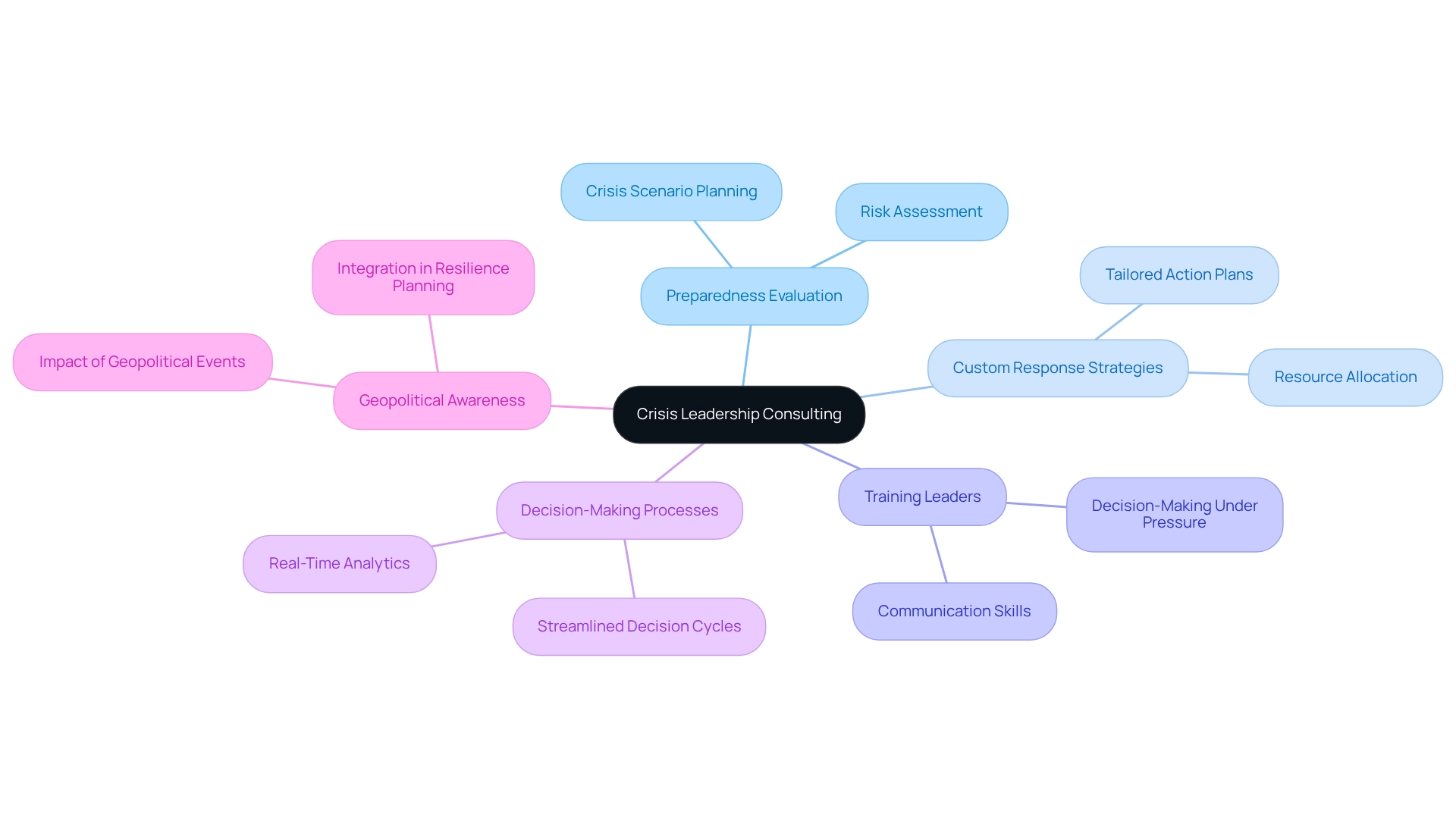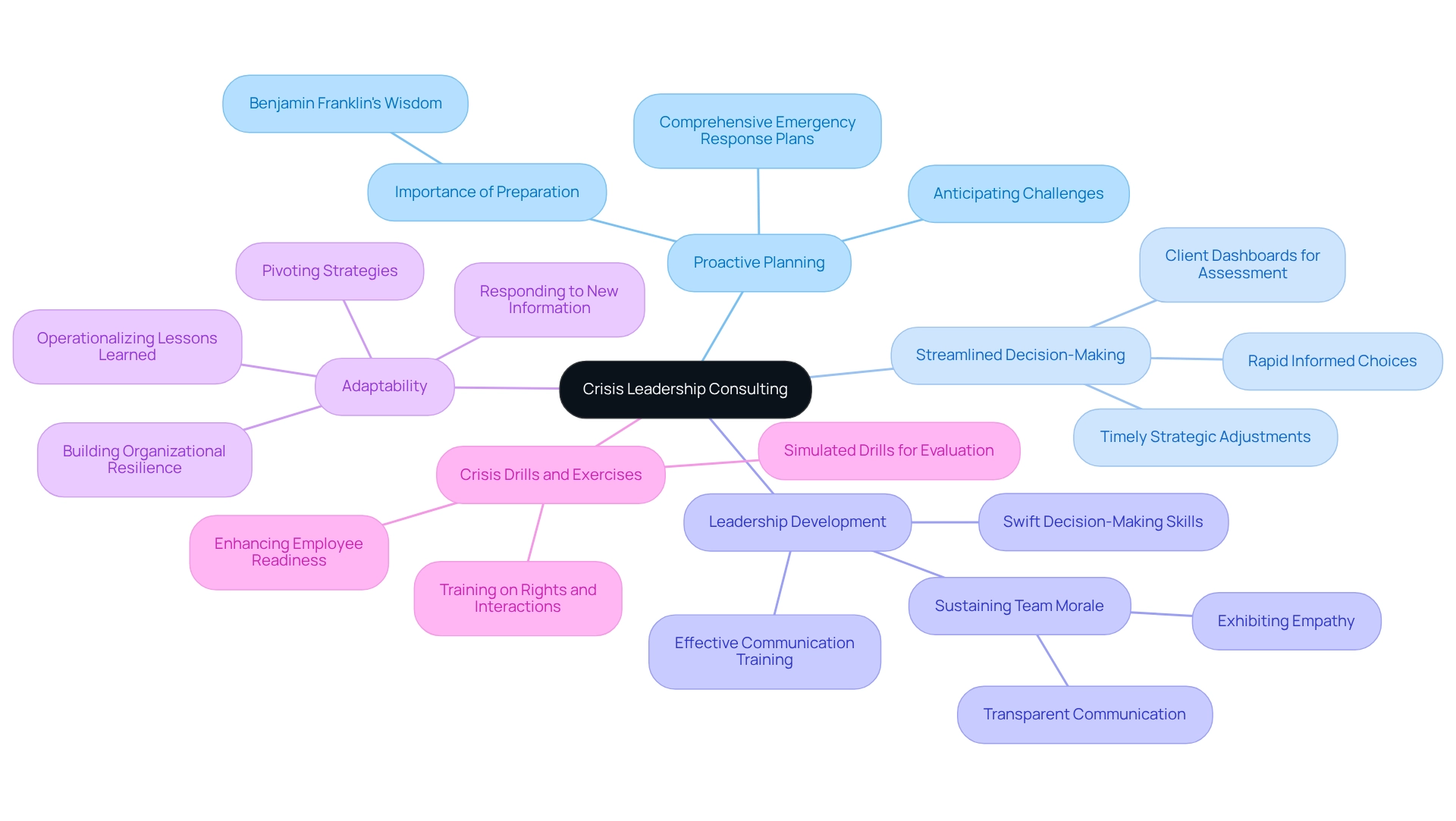Overview
Crisis leadership consulting is essential for enhancing business resilience. It equips leaders with the skills necessary to navigate emergencies, streamline decision-making, and foster effective communication within teams. This consulting approach not only prepares organizations for immediate challenges but also cultivates long-term adaptability.
Successful applications across various sectors during crises, such as the COVID-19 pandemic, serve as compelling evidence of its effectiveness. Organizations must recognize the value of investing in crisis leadership consulting to ensure they are not just reactive but proactive in their approach to resilience.
Introduction
In an increasingly unpredictable world, the ability to lead effectively during a crisis is a critical competency for organizations across all sectors. Crisis leadership consulting emerges as a vital resource, equipping leaders with the skills and strategies necessary to navigate turbulent times with confidence and clarity. This specialized discipline not only focuses on developing comprehensive crisis management plans but also emphasizes the importance of real-time analytics, streamlined decision-making, and empathetic communication.
As organizations face a growing array of challenges—from economic instability to global health emergencies—understanding the nuances of crisis leadership becomes essential for fostering resilience and ensuring long-term success. Through proactive planning and a commitment to learning from past experiences, crisis leadership consulting empowers organizations to not just survive crises but to emerge stronger and more adaptable in the face of future uncertainties.
Defining Crisis Leadership Consulting
Crisis leadership consulting represents a specialized domain within emergency response, equipping organizational leaders with essential skills and strategies to navigate emergencies effectively. Crisis leadership consulting involves a thorough evaluation of a company's preparedness for potential crises, the development of customized response strategies, and training leaders to make informed decisions under pressure. Unlike traditional emergency management, which often focuses on operational or logistical responses, crisis leadership consulting emphasizes the human element—empowering individuals to inspire, communicate, and lead their teams during challenging times. This approach is crucial for fostering resilience, enabling organizations to recover and thrive after emergencies.
A pivotal component of effective crisis leadership is the ability to streamline decision-making processes. By facilitating a shortened decision-making cycle, leaders can act decisively to safeguard their businesses during critical junctures. Furthermore, the incorporation of real-time analytics allows organizations to continuously assess their performance and evaluate business health, ensuring that strategies are adapted as necessary. Recent trends reveal that organizations are increasingly acknowledging the importance of geopolitical awareness in their resilience planning, with geopolitical events ranking fourth in their operational impact, trailing only data and cybersecurity incidents. By adopting a comprehensive view of resilience that encompasses various risks, organizations can elevate leadership during emergencies as a strategic imperative, ultimately enhancing their capacity to withstand and recover from challenges. As Bobbie Ramsden-Knowles, Global Crisis & Resilience Co-Leader, asserts, 'Discover our global network,' highlighting the critical role of collaboration in difficult situations. Additionally, the report titled 'Future Directions for Organizational Resilience' advocates for organizations to expand their focus beyond operational resilience towards a more integrated approach that includes strategic thinking and cross-functional collaboration. Businesses are urged to proactively enhance their emergency management practices to effectively navigate challenges.

Context and Importance of Crisis Leadership Consulting
In recent years, the occurrence and intricacy of challenges encountered by entities have risen substantially. Factors such as economic instability, technological disruptions, and global health emergencies have underscored the necessity for strong guidance during crises. As a result, crisis leadership consulting has emerged as an essential asset for entities aiming to enhance their resilience and adaptability. By concentrating on management development and implementing insights gained, this consulting practice assists entities in preparing for unexpected challenges, ensuring that leaders are equipped to react decisively and compassionately.
Moreover, the 'Test & Measure' approach is vital, emphasizing a data-driven methodology for testing hypotheses to maximize returns on invested capital. The integration of real-time analytics through a client dashboard enables organizations to continually monitor their performance, allowing them to 'Decide & Execute' effectively and 'Update & Adjust' strategies as needed. The significance of crisis leadership consulting cannot be overstated, as effective management during challenging times can determine the difference between organizational survival and failure.
Key Characteristics of Crisis Leadership Consulting
Crisis leadership consulting is defined by several key elements that greatly enhance its effectiveness, including proactive planning where consultants work with organizations to create comprehensive emergency response plans that anticipate potential challenges and outline clear reaction strategies. This proactive approach is vital, echoing Benjamin Franklin's wisdom that failing to prepare is preparing to fail. Data indicates that well-defined protocols are essential for effective emergency management, underscoring the necessity of thorough preparation.
Streamlined Decision-Making: A critical component of leadership during emergencies is the ability to make rapid, informed choices. By fostering a streamlined decision-making process, crisis leadership consulting empowers organizations to take decisive actions during emergencies, thereby preserving business integrity and performance. By utilizing client dashboards, organizations can effectively assess their business health, allowing for timely strategic adjustments as circumstances evolve.
Leadership Development: Training leaders to communicate effectively, make swift decisions, and sustain team morale during challenging situations is essential. Developing these skills is essential in crisis leadership consulting, as it ensures that leaders can confidently guide their teams through turbulent times; successful leaders in challenging situations prioritize transparent communication and exhibit empathy towards their teams. This fosters trust and teamwork, which are vital for effectively managing challenges.
Adaptability: The capacity to pivot and adjust strategies in response to changing circumstances is essential. Effective emergency management, as highlighted in crisis leadership consulting, requires leaders to remain adaptable and responsive to new information and evolving dynamics, while commitment to operationalizing lessons learned fosters strong, lasting relationships within the organization. This commitment ensures that teams are better prepared for future challenges, emphasizing the role of crisis leadership consulting in assessing and deriving insights from emergencies to enhance future responses. This reflective practice bolsters organizational resilience and equips teams for upcoming challenges.
A significant example of proactive planning in action is the execution of emergency drills and exercises. Organizations that conduct simulated exercises to evaluate their emergency response plans and communication strategies find that consistent training enhances employee readiness. This ensures that the emergency management team is prepared to efficiently handle real-life scenarios, emphasizing the importance of readiness in managing emergencies. The objective of emergency preparedness planning is to anticipate future emergency situations and devise effective countermeasures, further highlighting the need for proactive strategies.

Applications and Examples of Crisis Leadership Consulting
Crisis leadership consulting has demonstrated its versatility and effectiveness across various sectors, particularly through the lens of streamlined decision-making and real-time analytics. Significant applications include:
- Healthcare Sector: In response to the COVID-19 pandemic, healthcare organizations sought the expertise of consultants to develop rapid response strategies. This approach enabled leaders to manage resources effectively while ensuring clear communication with both staff and patients, thus maintaining operational continuity during a critical period. The utilization of real-time business analytics facilitated ongoing monitoring of health metrics, allowing for timely adjustments to strategies. Case studies from healthcare consulting during the pandemic illustrate how organizations adapted their approaches to meet urgent needs.
- Retail Industry: Retailers confronting supply chain disruptions turned to emergency consulting to equip their teams with flexible strategies. This preparation allowed them to respond swiftly to changing market conditions, minimizing the impact of disruptions on their operations and customer satisfaction. The Philippines Typhoon Reconstruction Pilot exemplifies this, where emergency guidance consulting played a crucial role in the retrofitting and rebuilding of homes, underscoring the importance of efficient oversight in urgent situations. Emphasizing the evaluation of hypotheses and the implementation of lessons learned was essential in tackling these challenges.
- Hospitality Sector: Hotels and restaurants have also benefited from consulting on crisis management. By adopting robust communication strategies and leveraging real-time analytics, these businesses maintained customer trust and loyalty amid operational challenges, showcasing resilience in adversity. The Durable Returns Program in Iraq further demonstrates how emergency response strategies can aid families in rebuilding their lives in secure conditions following displacement, highlighting the broader impact of effective crisis leadership consulting during emergencies.
These examples underscore how crisis leadership consulting not only prepares organizations for immediate challenges but also cultivates long-term resilience and adaptability, vital for navigating future uncertainties. As a General Manager aptly noted, 'One of the most beneficial lessons learned is the power of working in cross-functional teams,' emphasizing the collaborative essence of successful crisis management.
Conclusion
Crisis leadership consulting is essential for equipping organizations with the skills and strategies required to navigate turbulent times effectively. By emphasizing proactive planning, streamlined decision-making, and real-time analytics, this specialized discipline empowers leaders to respond adeptly to crises. The focus on empathetic communication and leadership development ensures that teams are not only prepared to tackle immediate challenges but also capable of fostering resilience for the future.
The increasing complexity and frequency of crises in today's world underscore the necessity for organizations to embrace crisis leadership consulting as a vital resource. Across sectors such as healthcare, retail, and hospitality, the ability to adapt and make informed decisions under pressure can significantly influence an organization's survival and success. Moreover, the commitment to learning from past experiences and operationalizing these lessons further enhances an organization's capacity to withstand future uncertainties.
Ultimately, investing in crisis leadership consulting transcends mere crisis management; it cultivates a culture of resilience and adaptability that enables organizations to thrive in unpredictable environments. By prioritizing effective crisis management strategies, organizations can not only weather the storm but emerge stronger, more cohesive, and better prepared for whatever challenges lie ahead.
Frequently Asked Questions
What is crisis leadership consulting?
Crisis leadership consulting is a specialized field within emergency response that equips organizational leaders with essential skills and strategies to navigate emergencies effectively, focusing on preparedness, customized response strategies, and decision-making under pressure.
How does crisis leadership consulting differ from traditional emergency management?
Unlike traditional emergency management, which often emphasizes operational or logistical responses, crisis leadership consulting focuses on the human element, empowering leaders to inspire, communicate, and lead their teams during challenging times.
Why is the human element important in crisis leadership?
The human element is crucial for fostering resilience, enabling organizations to recover and thrive after emergencies by ensuring effective communication and leadership during crises.
What is a key component of effective crisis leadership?
A key component is the ability to streamline decision-making processes, allowing leaders to act decisively to protect their businesses during critical moments.
How do real-time analytics contribute to crisis leadership?
Real-time analytics enable organizations to continuously assess their performance and evaluate business health, ensuring that strategies can be adapted as necessary during a crisis.
What recent trends are influencing organizational resilience planning?
Organizations are increasingly recognizing the importance of geopolitical awareness in their resilience planning, with geopolitical events being a significant factor impacting operations.
What approach should organizations take to enhance their resilience?
Organizations should adopt a comprehensive view of resilience that encompasses various risks, elevating leadership during emergencies as a strategic imperative to improve their capacity to withstand and recover from challenges.
What does the report 'Future Directions for Organizational Resilience' suggest?
The report advocates for organizations to expand their focus beyond operational resilience towards a more integrated approach that includes strategic thinking and cross-functional collaboration.
What is the call to action for businesses regarding emergency management practices?
Businesses are urged to proactively enhance their emergency management practices to effectively navigate challenges.




